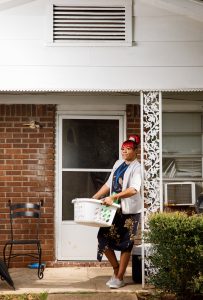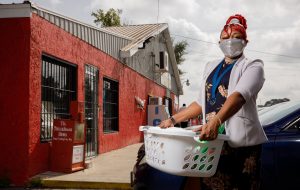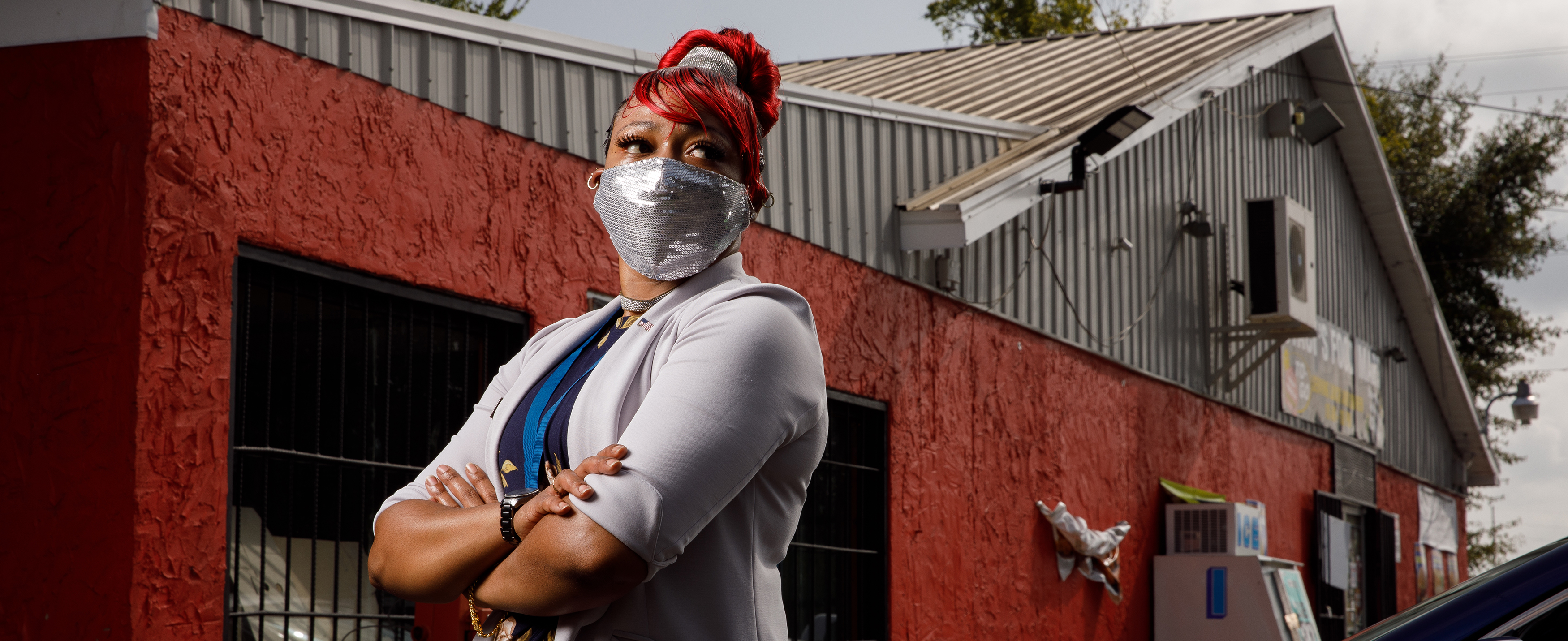Smith seeking partnerships to meet critical hygiene needs for West Side residents
Story by David Miller
Photos by Matthew Wood
Feb. 12, 2021

BSW student Yolanda Smith is keen to launch a mobile laundry service for Tuscaloosa’s West Side.
The warmth and humidity on this early September morning is an unwelcome reminder that summer’s reprieve is nowhere in sight.
Alabamians, though, are used to the balmy days of late summer. They proudly weather the heat and wear their dampened skin like a rite of passage.
Of course, sheltering in an air-conditioned room helps them endure these days. But, while most every home is outfitted with an air conditioner, this retreat comes at a price, especially for low-income people.
Yolanda Smith, a Tuscaloosa native and undergraduate social work major at the University of Alabama, feels the pinch of high energy costs. She rents a house on Tuscaloosa’s West Side, where she says her landlord will not outfit her home with an energy efficient A/C unit and windows, or improved insulation. And, as a caregiver for her mother – a stroke survivor who lives with her – the home needs to be cooled 24 hours a day.
Unpaid utilities and rent, regardless of circumstances, can result in wage garnishment and eviction, Smith said.
“It’s a challenge, not just for me, but a lot of people on the West Side,” Smith said. “There are a lot of people struggling to make ends meet, and with COVID-19 forcing everyone inside and the majority of people’s jobs putting them in direct exposure to COVID, it’s made surviving even more difficult.”
Paying bills and putting food on the table are essential duties, and, as a result, other needs sometimes go unmet, she says.
One glaring deficit for many low-income families is having clean clothes, a need that’s been heightened during the COVID-19 pandemic, Smith says. Additionally, the effects of infrequently washed laundry have deeper, longer-lasting effects on one’s confidence and perception from others. Smith remembers times when her family struggled to have power to wash clothes for her and four younger siblings. The experience taught her to “make the best with what you have,” but “growing up poor” leaves few options to navigate these obstacles.
But, as Smith is learning, motivation, coupled with innovation, can be a launching point for change. Smith, a BSW student in the University of Alabama School of Social Work, is keen to bring her passion project – a mobile laundry service – into operation.
Inspired by a Tide mobile wash truck that offered to wash and fold laundry for Tuscaloosa residents after the April 27, 2011 tornado, Smith has worked for more than a year to build a plan and infrastructure and secure funding for a similar, full-time service in Tuscaloosa.
“[Tide] came to the University Mall parking lot and picked up all those clothes, and washed and folded them for me,” said Smith, whose home was destroyed by the tornado. “I couldn’t thank them enough. It’s those kinds of little things that people need to recover.”
Smith currently holds a federal contractor license and is seeking funding to start a non-profit mobile laundry service. She has a business plan and has identified a company from which to purchase trucks that meet emergency management specs. However, building partnerships and raising capital has proven difficult.
“Things have slowed down since COVID, and I feel like I’m trying to speak [the project] into existence,” Smith said. “Every social service worker I see asks if I’ve started it yet, but I don’t have the credit or collateral.”
Coping with COVID-19
The COVID-19 pandemic has taken a devastating toll on Smith’s family and her neighborhood. She says that both of her neighbors have died due to COVID-19, and that four of her family members have passed since March, 2020.
Her brother, Christopher Smith, suffered a stroke and died at age 31. Yolanda had custody of her siblings since she was 18 and had been Christopher’s caregiver after his first stroke.
An autopsy of Christopher’s body ruled out COVID, Yolanda said, but his passing was a shock to the family.
“We knew [Christopher] was high-risk for another stroke,” she said, “but a fever worsened to him not waking up at all.
“He was taking his meds, and we were monitoring his blood pressure, so we don’t know what happened.”
Yolanda now works to keep her mother, who cannot walk on her own or speak, isolated from visitors and safeguarded against COVID-19.
Being a caregiver is one of many challenges Yolanda and her family face, but her family extends beyond the walls of her home. She serves her West Side neighbors in a variety of ways, from helping connect them to social services and delivering food boxes from area agencies, to cooking meals and helping guide neighbors through the federal unemployment process.
Getting these meals to people has inherent challenges due to lack of transportation for many of her neighbors, and the risk of exposure to COVID-19 keeps many neighbors indoors and limits deliveries. Yolanda, though, coordinates with other neighbors to work around these limitations.
“I can’t sit in my home and know people are starving,” Yolanda said. “And I can’t give them canned goods because of the sodium, so we are cooking the food for them.”
Limited transportation – regardless of potential exposure to COVID-19 by leaving one’s home – and a lack of appliances also forces families to be creative when doing laundry, often relying on other families and friends to host a “wash day.” But, if that family can’t afford detergent or to contribute to the host’s water bill, then that option isn’t available, Yolanda says.
The passion, the plan, the pitch

Smith’s business plan is finalized, but she’s seeking financial backing and local partnerships to get her project off the ground.
When Yolanda worked at Community Service Programs of West Alabama, she was able to connect her experiences as a client with the tedious and sometimes complicated process of paperwork, policies and procedures. There, she helped streamline the process for residents to get their power restored to their home, and she built valuable rapport with elderly clients.
That job showed Yolanda that she could not only help people directly, but that she could also launch and operate her mobile laundry as a non-profit. She eventually left that job to pursue a BSW at UA.
“I saw where my limitations were,” she said. “I needed to go back to school.”
Almost immediately upon enrolling in the School of Social Work, Yolanda found a familiar and welcomed voice in Kristy Holt, instructor and Title IV-E Coordinator for the School of Social Work. Yolanda said she was one of Holt’s clients while Holt worked for the Alabama Department of Human Resources.
“When I started class, I was just so happy to hear [Holt] acknowledge their system was flawed for certain people,” Yolanda said. “It brought my anxiety down and motivated me even more.”
Yolanda’s other experiences at UA have been equally fruitful and formative, especially as it relates to her project. For instance, in one of her early semesters, she mistakenly enrolled in an English engineering class and considered dropping it, but her professor, upon learning of her passion project, encouraged her to stay in the class. There, she learned of the Edward K. Aldag Business Plan Competition, where students pitch business plans and prototypes and compete for cash prizes. Statewide business leaders judge the competition and provide feedback to entrants.
Yolanda would compete in the 2019 Aldag competition, and though she didn’t place or win a cash prize, the feedback and networking opportunities were invaluable, she says. For instance, one of the judges told her to consider partnering with military veterans’ support agencies or with the City of Tuscaloosa’s emergency management department.
“A lot of people from Aldag have kept in touch, but they were honest: people needed to see it in action to spur investment,” Yolanda said. “I’ve talked to a few people – I met a man from Southern Research Group who reached out to Alabama Power to see if they wanted to coordinate with me.
“But after Aldag, I didn’t know what to do because I knew this wouldn’t make a lot of money.”
Yolanda is “out of ideas” and is desperately seeking a government or non-profit agency to partner with. She could use help in writing grants, too.
“I just feel like I’m lost,” she says. “How can I get this off the ground and put it to use in my city? I know this could work.”
